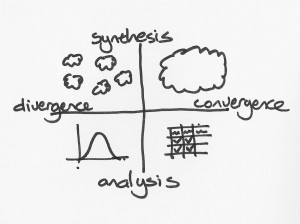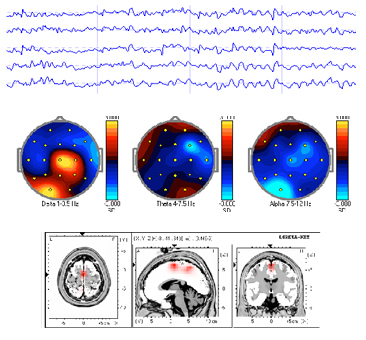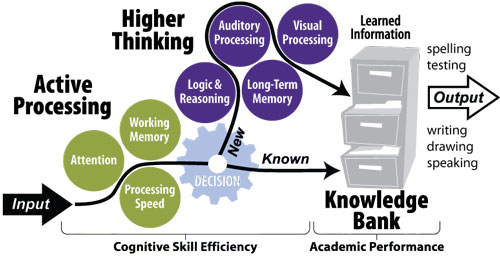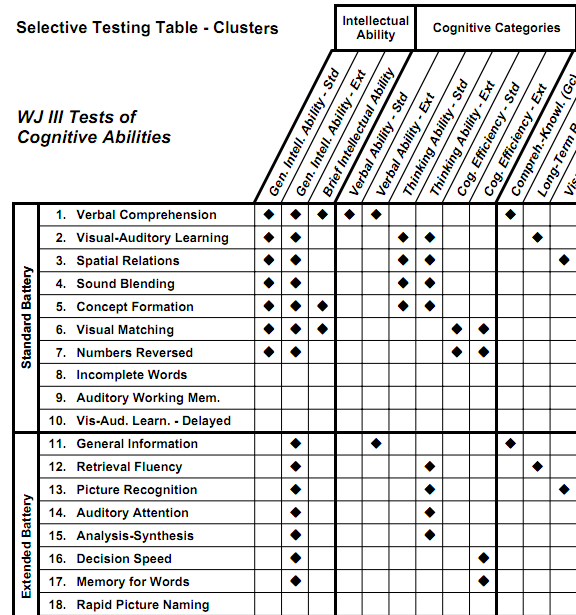Music Lessons Offer Lifelong Cognitive Benefits
 Music is great for the brain in many ways. Learning to play a musical instrument is an excellent investment in improving brain function and cognitive performance. An interesting new study suggests that the brain boost we get from music lessons may last a lifetime. The study reported by the American Psychological Association examined the cognitive performance of adults (ages 60 t0 83) that studied music in childhood.
Music is great for the brain in many ways. Learning to play a musical instrument is an excellent investment in improving brain function and cognitive performance. An interesting new study suggests that the brain boost we get from music lessons may last a lifetime. The study reported by the American Psychological Association examined the cognitive performance of adults (ages 60 t0 83) that studied music in childhood.
“The high-level musicians who had studied the longest performed the best on the cognitive tests, followed by the low-level musicians and non-musicians, revealing a trend relating to years of musical practice. The high-level musicians had statistically significant higher scores than the non-musicians on cognitive tests relating to visuospatial memory, naming objects and cognitive flexibility, or the brain’s ability to adapt to new information.”
While these findings are tentative and require additional research, they do signal that musical training is a powerful tool for building your Next Brain.
Interested to hear from readers that were trained musically as children. How has that shaped your cognitive skills as an adult?
Categories: Child, IQ and EQ, Memory and Learning, Music and Audio, Older Adult, Perception, Problem Solving, Training Tags:
Get Some Mental Toughness on April 25th
 Mental toughness is the idea that we can train our brains to be in a higher state of readiness and more resilient to stress and challenges from the environment. The idea grew out of sports psychology where high performing athletes exert tremendous mental control and focus on demand and under great pressure. It is being applied in the US military and is the subject of dozens of books aimed at improving success in ordinary life.
Mental toughness is the idea that we can train our brains to be in a higher state of readiness and more resilient to stress and challenges from the environment. The idea grew out of sports psychology where high performing athletes exert tremendous mental control and focus on demand and under great pressure. It is being applied in the US military and is the subject of dozens of books aimed at improving success in ordinary life.
We have covered some of the techniques of mental toughness here in the Next Brain Blog. For those interested in learning more I recommend checking out the Mental Toughness Summit. This is a free on-line event that runs from April 25-29th. Some of the best names in the business are involved and it is sure to be loaded with specific ideas from improving brain function and cognitive performance. The host, Renita Kalhorn, will interview 12 leaders in the field. Attendees get to listen in as well as review recording of the interviews over a 24-hour period. There is also the option to upgrade to a premium service where you pay for an MP3 of the interviews.
I am going to attend as much as possible and will blog what I learn. I hope some readers are able to attend too and will share their insights.
Categories: Cognitive Development, Mental Focus, Training Tags:
Learning Self Control Early Drives Success
 Developing Your Next Brain, or making an effort to improve brain function and reach peak cognitive performance takes a lot of work. One reason we do it is to live a more successful life. While life success has many facets most agree that a cornerstone is self control. Being able to shape our own thinking and emotional responses, manage impulses, avoid self defeating assumptions and persistence in the face of obstacles is critical to living the good life. This has little to do with IQ and a lot to do with your ability to manage yourself.
Developing Your Next Brain, or making an effort to improve brain function and reach peak cognitive performance takes a lot of work. One reason we do it is to live a more successful life. While life success has many facets most agree that a cornerstone is self control. Being able to shape our own thinking and emotional responses, manage impulses, avoid self defeating assumptions and persistence in the face of obstacles is critical to living the good life. This has little to do with IQ and a lot to do with your ability to manage yourself.
There is considerable evidence to support this claim. Take for example, the recent research reported in Science News that suggests:
Good self management skills as early as age three predict health and wealth in adulthood.
The findings are dramatic:
“Low levels of conscientiousness, perseverance and other elements of self-control in youngsters as young as age 3 herald high rates of physical health problems, substance abuse, financial woes, criminal arrests and single parenthood by age 32, says an international team led by psychologists Terrie Moffitt and Avshalom Caspi of Duke University in Durham, N.C.”
How can children develop higher levels of self-control? Research from another group reported in the article claimed behavioral rewards, developing coping skills and role playing simulation using videotape are key. None of this is rocket science. For example, coping skills can include blowing bubbles and making funny faces. The rub is to learn to do these things rather than getting angry or stressed and yelling at others or giving up on a goal.
Very interested to hear from readers that have experience with specific techniques for improving self control and self management skills in children.
Categories: Child, Executive Function, Manage Emotions, Other, Training Tags: EQ, experiential learning
Speaking Two Languages Acts as Mental Gym
 New research from Penn State, Juggling Languages Can Build Better Brains, overturns previous thinking about the impact speaking more than one language on brain function. Rather than creating confusion, it turns out that being bilingual or learning to speak a second language can improve your ability to multi-task. Specifically:
New research from Penn State, Juggling Languages Can Build Better Brains, overturns previous thinking about the impact speaking more than one language on brain function. Rather than creating confusion, it turns out that being bilingual or learning to speak a second language can improve your ability to multi-task. Specifically:
“Recent research indicates that bilingual speakers can outperform monolinguals–people who speak only one language–in certain mental abilities, such as editing out irrelevant information and focusing on important information, said Judith Kroll, Distinguished Professor of Psychology, Penn State. These skills make bilinguals better at prioritizing tasks and working on multiple projects at one time.”
Learning a second language requires considerable time and energy. You also need to be in a situation where you can use both languages regularly. Despite these difficulties techniques proven to build your mental focus are rare. Improved mental focus pays a lifetime of benefits.
Interested to hear from bi or multi lingual readers willing to share their impressions on how additional languages are impeding or accelerating their brain function and cognitive performance.
Categories: Mental Focus, Problem Solving, Training Tags:
Brain Training Lowers Car Crashes by 50%
 Systematic brain training using software to improve your cognitive performance is a relatively new technique. The software acts like a brain gym working your memory, visual cognition, speed of processing, numeracy, decision-making skills and the like to make them bigger and stronger. More than 10 vendors will sell you a package and program ranging in price from $20 to hundreds. We have covered most of them here on the Next Brain Blog.
Systematic brain training using software to improve your cognitive performance is a relatively new technique. The software acts like a brain gym working your memory, visual cognition, speed of processing, numeracy, decision-making skills and the like to make them bigger and stronger. More than 10 vendors will sell you a package and program ranging in price from $20 to hundreds. We have covered most of them here on the Next Brain Blog.
But does it work? And does it work better than solving crossword puzzles, playing video games or other mentally stimulating things we do for fun? There is compelling evidence that brain training software has impact it is just not clear how much.
So I am always on the lookout for new studies that look at the effectiveness of brain training software. For example, Posit Science recently publish a synopsis of two studies done in 2010. Note Posit Science sells brain training software but the studies were conducted by academic researchers in neuroscience and psychology. These are interesting because both studies show improvement in cognitive performance on tasks outside the training software. One even demonstrated a 50% reduction in at-fault car crashes over a six year period:
“This study looked at crash records for 908 older drivers who trained on a version of Posit Science’s Road Tour exercise six years earlier. Road Tour expands “useful field of view,” how much a person can take in with a single glance. Useful field of view is critical to safe driving: a wider field can help drivers spot dangers in their peripheral vision in time to react. The study authors found that training with the Road Tour technology (called “speed-of-processing training” in the study) cut a driver’s crash risk. In fact, they were responsible for about 50% fewer crashes than their untrained peers. Road Tour is available as part of both the InSight and DriveSharp brain fitness programs.”
This is an important result. It shows that brain training software can improve the cognitive performance of older adults enough to impact an important daily activity.
Interested to hear from readers that use brain training software. How does it improve your cognitive performance in daily life?
Categories: Decision Making, Older Adult, Perception, Software, Training Tags: brain training
LearningRx – A Brain Training Center Near You
A reader shared an experience they had with LearningRx a consumer center for brain training. They promise to improve your academic performance by providing coached training on a full range of cognitive skills (see diagram).
The process starts with a formal assessment using the Woodcock-Johnson assessment for cognitive abilities (partially shown below).
You are then matched with a coach and work 3-5 days per week for an hour a day for 3 months. They claim a 3.6 year improvement on the cognitive assessment and have some studies to back it up.
LearningRx has centers across the US and they want to open more using a franchise approach. Interested to hear from other readers that have used this service.
Categories: Child, Cognitive Development, College Student, Memory and Learning, Mental Focus, Perception, Training Tags: brain training
Reclaim Your Divergent Thinking Talents
Many older adults worry about memory loss. This is a serious issue especially if it leads to dementia and the inability to do the activities of daily living.
But just as serious, and more so in many ways, is the dramatic loss of divergent thinking skills in young children.
One long-term study found that in a group of 1600 children those that ranked tops in divergent thinking dropped dramatically with age. Specifically, those achieving a top score for divergent thinking went from 98% in kindergarten to 32% five years later to just 10% when they reached early teens. Divergent thinking is a natural talent and is rapidly educated and socialized away.
 Divergent thinking is the capacity to see multiple options, alternatives or possibilities. The goal is not to find a solution but instead find an enormous range of potential and therefore very different solutions. For example, how many interesting uses can you find for a rubber band? On average people might find 10-20, genius level performance would generate in excess of 150. The trick to generating many more options is to begin to relax assumptions about what a rubber band is. What if it was a mile long? Of course, some would claim that is cheating, as we have all been taught to do. Just as there is one right answer so why worry about so many?
Divergent thinking is the capacity to see multiple options, alternatives or possibilities. The goal is not to find a solution but instead find an enormous range of potential and therefore very different solutions. For example, how many interesting uses can you find for a rubber band? On average people might find 10-20, genius level performance would generate in excess of 150. The trick to generating many more options is to begin to relax assumptions about what a rubber band is. What if it was a mile long? Of course, some would claim that is cheating, as we have all been taught to do. Just as there is one right answer so why worry about so many?
The question is how can we reclaim our genius level of performance in divergent thinking? How can we then channel it into creative expression and break-through problem solving?
Mind mapping, journaling and traditional brainstorming are techniques that are typically offered to those looking to build divergent thinking skills.
Start simple with brainstorming by yourself but apply it to a practical problem that means something to your right now.
Here is what you do. Let’s say you are buying a new computer. Use divergent thinking to decide what to do with the old one. Set a time limit (say 20 minutes at most), and list as many ideas as you can. Best to write them down. Go for the largest number, don’t worry if they are good/bad, look at how you can combine ideas and allow for the weird and strange. Have fun with it. Open up your mental jets.
 With continued practice your mind will get use to this mode of thinking again and you will start to reclaim your divergent thinking talent. Consider using mind mapping or some other way of seeing how your ideas related to each other visually. Include others. Let alternatives bubble up all day or all week and capture them in a journal as you go. Soon your thinking will diverge far and fast when you want it to. The payoff? Good ideas that you would have normally never even considered.
With continued practice your mind will get use to this mode of thinking again and you will start to reclaim your divergent thinking talent. Consider using mind mapping or some other way of seeing how your ideas related to each other visually. Include others. Let alternatives bubble up all day or all week and capture them in a journal as you go. Soon your thinking will diverge far and fast when you want it to. The payoff? Good ideas that you would have normally never even considered.
Interested to hear form readers that practice divergent thinking. What techniques do you use?
Categories: Lifestyle, Problem Solving, Training Tags: creativity, processing speed
2nd Language Boosts Cognitive Control & Reserve
 According to research recently reported in the Wall Street Journal, Building a More Resilient Brain, you can improve thinking and brain health by learning a new language. There is some evidence that learning a second language can improve your cognitive control (stop paying attention to one thing and focus on another) and may stave off the effects of dementia for several years by building up cognitive reserve. Unfortunately, it is not know when in life it is best to learn the language and if you need to use it daily to get these benefits.
According to research recently reported in the Wall Street Journal, Building a More Resilient Brain, you can improve thinking and brain health by learning a new language. There is some evidence that learning a second language can improve your cognitive control (stop paying attention to one thing and focus on another) and may stave off the effects of dementia for several years by building up cognitive reserve. Unfortunately, it is not know when in life it is best to learn the language and if you need to use it daily to get these benefits.
Learning a second language is a major undertaking but does promise to improve brain function and cognitive performance. Very interested to hear from readers that have learned a second language and believe it has had brain boosting effects.
Categories: Child, Cognitive Decline, Memory and Learning, Mental Focus, Older Adult, Training Tags:
Advanced Neurofeedback Training Near You?
 In neurofeedback training you learn to regulate your brainwaves. As the neurons in your brain fire they produce an electrical signature across your scalp call an Electroencephalograph or EEG. The EEG is detected using sensors on your head and is feed into a device that turns it into a signal such as a beep, movement of the cursor on a computer screen, a change in a video game or even the motion of a remote control toy. The idea is that the signal acts as feedback for learning to get your brain into a certain state such as relaxation, creative flow, higher processing speed, greater focus and so on.
In neurofeedback training you learn to regulate your brainwaves. As the neurons in your brain fire they produce an electrical signature across your scalp call an Electroencephalograph or EEG. The EEG is detected using sensors on your head and is feed into a device that turns it into a signal such as a beep, movement of the cursor on a computer screen, a change in a video game or even the motion of a remote control toy. The idea is that the signal acts as feedback for learning to get your brain into a certain state such as relaxation, creative flow, higher processing speed, greater focus and so on.
Neurofeedback is a powerful tool for improving your brain function and cognitive performance and will be covered frequently on the Next Brain Blog. Getting access to clinical grade neurofeedback training can be hard and costly. That may be changing with Neurotopia’s recent announcement of a remote version of their NeuroStation:
“The NeuroStation™ REMOTE is the first technology designed specifically for widespread adoption of neurofeedback. Neurotopia represents a paradigm shift by bringing neurofeedback into the consumer market through healthcare providers, academic centers, and sports performance facilities.”
Neurotopia is well-known for using the most advanced protocols and equipment to achieve real results with neurofeedback. They have specific protocols for achieving peak performance. It includes zone, reaction time, balance, recovery and sleep techniques and is applicable to sports, business and all walks of life.
Interested to hear from readers that have experience with Neurotopia’s approach or other clinician delivered neurofeedback training for peak cognitive performance.
Categories: Mental Focus, Software, Training Tags: neurofeeback
Putting Science into the Art of Brainstorming
 I get email from readers asking about how to run brainstorming sessions. These are group meetings that are designed to come up with creative new ideas on hard problems. Many times such meeting can be a disappointment. The questions is – what specific practices can we use to improve group cognitive performance during brainstorming? Just the stuff we want to discuss on the Next Brain Blog.
I get email from readers asking about how to run brainstorming sessions. These are group meetings that are designed to come up with creative new ideas on hard problems. Many times such meeting can be a disappointment. The questions is – what specific practices can we use to improve group cognitive performance during brainstorming? Just the stuff we want to discuss on the Next Brain Blog.
North Carolina University just released a comprehensive study that Finds Brainstorming Rules Can Lead to Real-World Success in Business Settings.
“The study found that there are 21 specific best practices that contributed to successful brainstorming efforts, and that the benefits of high quality brainstorming could be attained when at least 10 to 11 of those practices are put into place – such as the inclusion of subject-matter specialists and an openness to input from all team members.”
This is one of the few empirical studies I have found that shows the quality of brainstorming can impact group decision-making. You can find the details in a free draft version of the paper. They quote a lot of interesting research some of which flies in the face of normal practice. For example:
“More importantly, contemporary experimental research by Lynch et al. 2009 and Hunton and Gold 2010 find that the brainstorming methods that are predominant in practice e.g., face-to-face communication and open brainstorming are less effective than alternative methods e.g., electronic communication and round robin brainstorming.”
Categories: Decision Making, Problem Solving, Training Tags:


